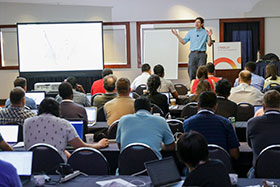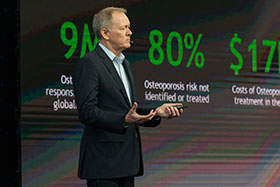Executive Briefings: AI Business Summit
Over the past year, executives at nearly every company have come to see AI as the next set of technologies that can become a critical driver of value. The AI Conference grew up alongside this realization. Whereas our initial audience was made up mostly of technical practitioners in new roles (data scientist, deep learning engineer, AI engineer, AI researcher), our audience now also includes high-level executives with responsibilities in technology, marketing, finance, research and development, and general management. In order to better serve this leadership audience, we will introduce more non-technical content in 2018.
At the center of the Business Summit within the AI Conference is a series of Executive Briefings: 40-minute overviews that cover topics of specific interest to executives (CxOs, vice presidents of technology, chief data officers, IT directors, etc.). At every AI Business Summit we'll cover a set of core topics that are of immediate concern to nearly every executive, as well as additional topics relevant to the local audience.
These Briefings describe recent technical progress in the field, but more importantly they include actionable frameworks that executives can immediately apply to their own work. Presentations at the AI Business Summit should focus on managerial discussion and be accessible to a wide range of practitioners and generalists. Because these are Briefings aimed at decision-makers we are looking for vendor-neutral perspectives and content.




Ongoing categories
- Culture: a broad category encompassing team structure, identifying and shepherding use cases, AI-driven management, talent training, recruiting, and retention
- Verticals: AI technologies in verticals including financial services, media and advertising, healthcare and the life sciences, education and training, public sector and national defense, manufacturing, transportation and logistics, and robotics
- Domain specific applications: AI in Finance, Marketing, HR, and Business Planning & Management
- Privacy, fairness, ethics, and compliance: regulatory frameworks including FTC, FCC, GDPR, and general guidance on managing with privacy in mind
- Interacting with AI: design and interfaces, product management, collecting and managing user interaction metrics, AR and VR, bots
- Infrastructure and developer tools: software and hardware topics critical to understanding how to use AI in practice, including technology options and tools, cloud computing, best practices for enterprise adoption and migration.
- Architecture: architecting and designing AI products, cloud vs. edge computing
- Machine learning: unsupervised/supervised/reinforcement learning, deep learning and other machine learning methods, interpretability
- AI building blocks: natural language, computer vision, speech technologies, emotion detection, multi-modal systems, search, knowledge bases
- Security: securing AI applications, secure execution, adversarial machine learning
- Data: training data, data exchanges, data strategy, data network effects
- Business models and monetization strategies
- Public policy: government initiatives and regulations, impact of automation on the economy, AI safety
Presented by
Elite Sponsors
Strategic Sponsors
Diversity and Inclusion Sponsor
Impact Sponsors
Premier Exhibitor Plus
R & D and Innovation Track Sponsor
Contact us
confreg@oreilly.com
For conference registration information and customer service
partners@oreilly.com
For more information on community discounts and trade opportunities with O’Reilly conferences
Become a sponsor
For information on exhibiting or sponsoring a conference
pr@oreilly.com
For media/analyst press inquires








